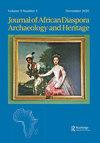闭门造车:巴西奴隶屋内部区域的空间、体验和物质性
Q1 Arts and Humanities
Journal of African Diaspora Archaeology and Heritage
Pub Date : 2016-05-03
DOI:10.1080/21619441.2016.1204793
引用次数: 4
摘要
这篇文章着重考察了巴西农村奴隶制的某些方面。讨论将借鉴18世纪和19世纪两个种植园的数据。通过对这些案例的分析,本文揭示了种植园经营者为了更好地控制俘虏的生活而在景观中创造的机制。这项研究还考察了被奴役的个体如何在生活区域内创造互惠的实践和知识领域,使他们能够自己生产和复制实践。本文的结语部分强调了被奴役个体的生存场所对其文化和社会生存的意义。本文章由计算机程序翻译,如有差异,请以英文原文为准。
Behind Closed Doors: Space, Experience, and Materiality in the Inner Areas of Brazilian Slave Houses
This article focuses on the examination of some aspects of rural slavery in Brazil. Discussions will draw on the examination of data from two plantations from the eighteenth and nineteenth centuries. Through analysis of these case studies, this article exposes the mechanisms created in the landscape by plantation operators in order to exercise better control of captives’ lives. This study also examines how enslaved individuals created reciprocal practices and domains of knowledge within living areas that allowed them to produce and reproduce practices on their own. The conclusion of this text stresses the significance of the enslaved individuals’ living places for their cultural and social survival.
求助全文
通过发布文献求助,成功后即可免费获取论文全文。
去求助
来源期刊

Journal of African Diaspora Archaeology and Heritage
Arts and Humanities-History
CiteScore
0.80
自引率
0.00%
发文量
9
期刊介绍:
Journal of African Diaspora Archaeology and Heritage provides a focal point for peer-reviewed publications in interdisciplinary studies in archaeology, history, material culture, and heritage dynamics concerning African descendant populations and cultures across the globe. The Journal invites articles on broad topics, including the historical processes of culture, economics, gender, power, and racialization operating within and upon African descendant communities. We seek to engage scholarly, professional, and community perspectives on the social dynamics and historical legacies of African descendant cultures and communities worldwide. The Journal publishes research articles and essays that review developments in these interdisciplinary fields.
 求助内容:
求助内容: 应助结果提醒方式:
应助结果提醒方式:


